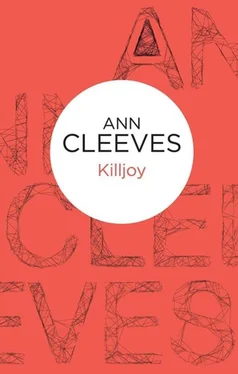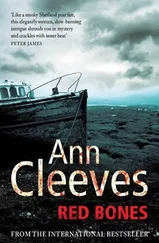Ann Cleeves - Killjoy
Здесь есть возможность читать онлайн «Ann Cleeves - Killjoy» весь текст электронной книги совершенно бесплатно (целиком полную версию без сокращений). В некоторых случаях можно слушать аудио, скачать через торрент в формате fb2 и присутствует краткое содержание. Жанр: Детектив, на английском языке. Описание произведения, (предисловие) а так же отзывы посетителей доступны на портале библиотеки ЛибКат.
- Название:Killjoy
- Автор:
- Жанр:
- Год:неизвестен
- ISBN:нет данных
- Рейтинг книги:5 / 5. Голосов: 1
-
Избранное:Добавить в избранное
- Отзывы:
-
Ваша оценка:
- 100
- 1
- 2
- 3
- 4
- 5
Killjoy: краткое содержание, описание и аннотация
Предлагаем к чтению аннотацию, описание, краткое содержание или предисловие (зависит от того, что написал сам автор книги «Killjoy»). Если вы не нашли необходимую информацию о книге — напишите в комментариях, мы постараемся отыскать её.
Killjoy — читать онлайн бесплатно полную книгу (весь текст) целиком
Ниже представлен текст книги, разбитый по страницам. Система сохранения места последней прочитанной страницы, позволяет с удобством читать онлайн бесплатно книгу «Killjoy», без необходимости каждый раз заново искать на чём Вы остановились. Поставьте закладку, и сможете в любой момент перейти на страницу, на которой закончили чтение.
Интервал:
Закладка:
‘Well?’ she demanded. She was blonde, very thin, attractive in a feverish neurotic way. ‘ Well, where have you been? Where’s your car? I was looking out for it.’
‘Look,’ he said. ‘I’ve had a hell of a day. Aren’t you going to let me in first?’
She stood aside and let him in to the kitchen. His breakfast plates were still in the sink and he thought wryly that she was slipping. She must be anxious not to have washed them up for him.
‘I need a drink,’ he said. ‘A bloody big drink.’
He walked through to his living room and stood by the uncurtained window and looked out at the boat moored against the quay. When he was young he had haunted the quay on Saturdays, picking up casual work gutting fish. In the boats’ romantic names he had imagined adventure. Now he was back here, only a couple of miles from the house where he’d been brought up. It didn’t feel much like success.
Jackie had been watching the television and Lynch heard an announcer on the late local news talk about a ram-raid attack on the Metro Centre in Gateshead. He stopped to switch off the television and the silence was broken immediately by the foghorn at the end of the pier.
‘You’re so late,’ she said, following him into the room with a drink. She stood close beside him. ‘I was worried. You hear such dreadful things. All this violence…’
‘Oh,’ he said automatically. ‘You listen too much to your old man.’ Then he realized what he had said and how close he had been to violence and he started to laugh.
‘It’s not fair,’ she said. ‘You know how hard it is to get away. I need to talk to you…’
He looked down into the street and watched two drunks stagger from the pub two hundred yards away as they made their way along the quay, stumbling on the cobbles.
‘What’s the matter with you?’ Jackie cried. ‘ Did you speak to Mrs Wood? What did she say?’
‘It’s no good,’ he said. ‘She wouldn’t listen.’
‘What are we going to do?’
‘I don’t know,’ he said. ‘It hardly seems to matter now.’
‘Of course it matters!’ She was beside herself with frustration. ‘We’re talking about your future. Our future.’
He turned back to her, suddenly sad and calm, he saw with detachment that she was a nuisance, that he could never be happy with her.
‘Look,’ he said. ‘I can’t talk about it now. Gabriella Paston’s dead.’
Amelia Wood’s husband was an architect. When she had married him as a young woman this had seemed a promising career, glamorous even. She had imagined him as an artist, creating brilliant designs in glass and steel. She had been working as a secretary in a solicitor’s office and saw marriage as a romantic escape. The reality had been rather different. The loft conversions and garage extensions which comprised her husband’s bread and butter work did little to inspire her and she soon decided that if she wanted glamour and excitement she would have to provide them herself. She had few qualifications-the small private girls’ school she had attended prided itself on its caring atmosphere rather than its academic achievement-and she knew she would never have the persistence to take a lowly position in a company and work her way up.
Her background made her turn naturally to voluntary work, community service. Confidence and an ability to get things done were all that seemed needed in that sector and she had those qualities in abundance. As her three children grew up she became steadily more influential. She chose high-profile projects with a satisfying element of social contact. In the organization of luncheons and celebrity appearances she became indispensable. The Grace Darling Project became her favourite charity. It brought her into contact with artists, musicians. She loved the bustle of the place, the strains of music, the younger people in leotards and tights gathering for the dance classes, the press attention. It made her feel important.
When the local councillor resigned she allowed herself, with some modesty, to be persuaded to stand as Conservative candidate for Martin’s Dene, one of the few safe wards in Hallowgate. She impressed the voters with her style, flair, and commitment, and won with a much increased majority. It seemed that all her energy was devoted to public life.
Dennis, her husband, was content to allow his wife to take centre stage. He was busy making money. He supported her, of course, it did no harm for someone in his business to have connections on the council. As the recession developed in the south, the north-east became suddenly a more fashionable place to live. He bought up an old chandler’s on the Hallowgate Fish Quay for next to nothing, converted it into flats which he sold at a profit. He saw the venture as a prototype, the first of many. But he was a grey, silent man, and he preferred to remain anonymous.
When Amelia left the Grace Darling Centre she was pleased with herself. Lynch was no fool. He had the sense to realize that his future lay, indefinitely, with the project. They would find it impossible to find another actor, with as high a profile, to be director. She drove down Anchor Street and along the edge of the Starling Farm council estate. A row of shops was boarded up and covered with graffiti and she felt a stab of personal annoyance that such vandalism could not be prevented. On a patch of wasteland a group of children were setting fire to the rubbish that had been dumped there. Their silhouettes against the flames had a demonic quality and she wondered automatically what their parents were thinking of to allow them out so late. Her children had been submissive, apathetic, and she had never had any difficulty in controlling them.
She drove past the concrete square of the sixth-form college towards the coast and the streets began to change. There were more trees and the gardens were bigger. She passed a tennis court and a church, a row of small shops, selling expensive dresses and French cheese. Martin’s Dene had once been a village and still considered itself separate from the urban sprawl of Hallowgate which had grown up to the west of it. There was a prized open space-a hill where children flew kites on Sunday mornings and a scrubby valley beloved by dog walkers and the riders of mountain bikes.
The Woods’ house was large, solid, rather unexciting. Dennis had bought it as an investment soon after they had married. He had recognized Martin’s Dene as a place where property would keep its value. Amelia found it rather dull. When she invited the arty friends met through the Grace Darling to parties there, she felt she had to apologize for it. She found Dennis rather dull too.
He was sitting in front of the television with a cup and saucer on his knee. He had removed his jacket so that it would not crease. She knew that he would already have eaten. He was quite used by now to providing his own meals. The plates would be stacked in the dishwasher. All trace of mess would be cleared away. She knew his routine exactly. He would watch the evening news, make a general comment on the weather forecast, then retire to his office for an hour to catch up on paperwork.
‘Had an exciting day?’ she asked, sarcastically, hoping to provoke a fight, knowing there would be no response.
‘So, so,’ he said, not noticing the irony. He was grey haired, bespectacled. She wanted to scream.
She took off her coat and hung it up, then returned to him.
‘What are you watching?’ she asked, just to disturb him, because she knew perfectly well already.
‘Only the local news.’
‘Anything interesting?’ she persisted.
‘Yes,’ he said. He turned his attention from the screen and looked at her directly. ‘There’s been a murder. In that Arts Centre where you’re trustee. A young girl has been stabbed. They found her body in the boot of Lynch’s car.’
Читать дальшеИнтервал:
Закладка:
Похожие книги на «Killjoy»
Представляем Вашему вниманию похожие книги на «Killjoy» списком для выбора. Мы отобрали схожую по названию и смыслу литературу в надежде предоставить читателям больше вариантов отыскать новые, интересные, ещё непрочитанные произведения.
Обсуждение, отзывы о книге «Killjoy» и просто собственные мнения читателей. Оставьте ваши комментарии, напишите, что Вы думаете о произведении, его смысле или главных героях. Укажите что конкретно понравилось, а что нет, и почему Вы так считаете.












